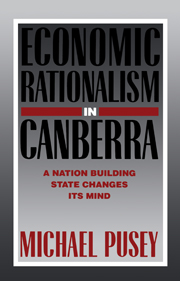Book contents
- Frontmatter
- Contents
- Preface
- INTRODUCTION: Canberra in the balance
- PART ONE Canberra: a state apparatus changes its mind
- PART TWO State and society: reflections, refractions, reductions
- CHAPTER 5 ‘Rationalisation’ and modernity: what has happened to the state's deliberative capacity?
- CHAPTER 6 Integrity under stress: the Lucky Country enters the world economy
- Appendixes
- Notes and References
- Index
CHAPTER 6 - Integrity under stress: the Lucky Country enters the world economy
Published online by Cambridge University Press: 14 January 2010
- Frontmatter
- Contents
- Preface
- INTRODUCTION: Canberra in the balance
- PART ONE Canberra: a state apparatus changes its mind
- PART TWO State and society: reflections, refractions, reductions
- CHAPTER 5 ‘Rationalisation’ and modernity: what has happened to the state's deliberative capacity?
- CHAPTER 6 Integrity under stress: the Lucky Country enters the world economy
- Appendixes
- Notes and References
- Index
Summary
She sailed a-way on a love-ly sum-mer's day
On the back of a croc-o-dile.
‘You see’, said she, 'He's as tame as tame can be,
I'll float him down the Nile'.
The croc winked his eye as the la-dy waved good-bye,
Wearing a hap-py smile.
At the end of the ride, the la-dy was in-side,
And the smile was on the croc-o-dile.
‘The Crocodile Ride ’In this chapter we turn to the larger evaluative context of Canberra's new economic rationalism and its implications for the destiny of a nation.
There is much to be learned from the experience of small to middlesized nations like Australia that are set on the semi-periphery of the world economy. More specifically we discover from both theoretical and practical points of view, that evaluations of the impact of economic rationalism are tied to rather unsteady constructions of nationhood and identity. For example it is easy to see that the impact of economic rationalism has an entirely different significance according to whether one is looking, on the one hand, at nations like those of South America that are in the grip of one type of empire or, on the other hand, at the nations of Eastern Europe that are breaking free from another empire of the older kind. In the first case the various reforms, ‘structural adjustments’, innovations, and other applications of economic rationalism claim primacy over civil society, identity, culture and nationhood. Conversely, in the second case of Eastern Europe, the burden of adjustment is partly reversed and one is invited to marvel instead at the extraordinary resilience and strength of civil society and, from that perspective, to redefine the coordinating structures of both economy and state as contingent realities and sometimes even as the objects of will and action.
- Type
- Chapter
- Information
- Economic Rationalism in CanberraA Nation-Building State Changes its Mind, pp. 208 - 242Publisher: Cambridge University PressPrint publication year: 1989



